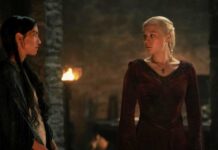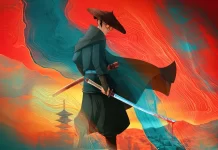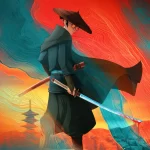
Photo: Andres Jimenez
Watchers on the Wall was lucky enough to score an exclusive interview with Ramin Djawadi, the composer of all seven (soon to be eight) seasons of Game of Thrones. During our chat, I asked Djawadi about his second and upcoming North American tour of the Game of Thrones Live Concert Experience which launches in September (complete tour info here!). He describes his composing process, how the tour has changed from year to year, what it’s like to write for different characters, and oh yeah- what he knows about season 8!
Hi Ramin, how are you?
Ramin: Good, thanks, how are you?
I write for WatchersontheWall.com and I was actually lucky enough to be able to see you in concert last year. I live in New York City, so I saw the performance at Madison Square Garden which was incredible.
Ramin: Awesome!
So, I’m very excited to hear that you’re all going out again in the fall and it looks really cool and I hope I can come see it again! First and foremost, one of the big things I was really curious [about] is, obviously last year was super successful, [and] looked really cool. Are there any major changes that you know of for this year or how is that process going?
Ramin: Yeah – we’ve done some major changes actually. We just came back from our European tour so we actually, just with all the logistics of bringing a stage over to Europe, we had to change some things so, obviously, it’s like remodeling a house, so, once you start – oh! Why’d we do the kitchen, we might as well do the bathroom, and so what happens is that we ended up completely redesigning the stage. This new concert now is a completely redesigned stage. We took a lot of the things from last year that we thought were really well received by the audience and we actually did even more fun things, like organic elements, for example, we added more pyro, people really love when we get the pyro going, so we have more of that, and we re-modified it. Without revealing too much, for example, there was the ‘Goodbye Brother’ piece, where our violinist is under the Weirwood Tree and this year we did something that I think is even cooler where our violinist becomes the Weirwood Tree and will actually go 35 feet up into the air and play our theme. It’s absolutely stunning. So, we did a lot of reworking, and now the big thing is, now that season 7 is behind us, I updated the show and added material from season 7, so it’s now current with the show itself and the storytelling we have.
How much does the change come from audience reaction vs. your favorite portions – you have seven seasons worth of work, so what’s that balance between you really want to do, trying out something different, vs. ‘the audience loved this – we should keep this.’
Ramin: Yeah, exactly, it’s a little bit of both. There are certain pieces that we definitely kept in the show, like ‘Light of the Seven,’ ‘Battle of the Bastards,’ these are definitely things that we didn’t wanna touch. Also, because I added season 7, there were definitely some things I had to move around or list, and it wasn’t easy, because if it was up to me, I would probably do a 6 hour concert. I have so much more I want to perform and I want to play and the show has just so many great moments and it’s just touch to condense it down to a 2 ½ hour show. But I guess what’s fun about it is we did one version last year and now automatically with updating the stage, and updating the music, it kind of has become business – there is a lot of familiar stuff from last year but there are a lot of new things in there, and I think it’s good.
That’s very good – I’m very excited to see it, and how it’s developed!
Ramin: I think if you’ve seen it last year, I think you will definitely be excited to see it the second time because it is so different, I mean the lighting, everything, is completely redesigned – the stage is actually not in the center anymore, it’s pushed to one side now. That enabled us to bring even more focus to the musicians. WE still have a massive screen behind us where we show the montages and scenes from the show, but that was something I really wanted to change from last year to put even more emphasis on the musicians and the lighting – so, a lot of things have changed.
I don’t know if you’ve begun to score season 8 – Does any of that material go into the show or is that not at all a part of this?
Ramin: To be honest I haven’t even started yet. I don’t know when I will start. I don’t have a schedule for it yet, or anything. I haven’t seen anything yet, I don’t know anything, I’m just as excited and curious as everybody else.
You’re as in the dark as I am, then!
Ramin: Absolutely, I mean this being the last season, I’m dying to know what’s happening and what it needs from me musically, and what am I gonna write for this final season – I can’t wait.
I’m glad to hear you are as enthusiastic as we are! How much of the rough cut do you need to see in order to make the score as much your own as you can, as opposed to being given a storyboard?
Ramin: I generally like to see as much story as possible, so I can really get a good idea. Sometimes, in the past, I’ve started writing based on a conversation with David [Benioff] and Dan [Weiss]. But overall, I really like to see things in front of me and have a clear understanding of the full storyline. In this particular case, people keep asking me ‘How would you…?’ ‘Musically, what are you planning to do…?’ And it’s hard for me to say anything, especially, with Game of Thrones, it’s a show that’s known for its surprises and for things that happen, and for me musically, I just literally have to sit and wait and see what comes my way.
Hopefully you get a preview into that soon – we’re all really excited.
Ramin: I hope so too!
Since the show is so expansive, and any episode can have 5 minutes of one character, and 5 minutes of another character, I wonder, you know, the score for me has always been one of the things that ties the show together. So, what is your approach to character progression from one season to the next? A major character like Jon Snow or Daenerys has a very specific through line from season 1 through season 7, so how do their scenes develop as the show goes on? How do you approach that?
Ramin: Season 1 really paid close attention to that, and really taking it one step at a time, because there are so many characters and we spend so much time with them, so sometimes we’ve decided, let’s just stay with all the Starks – they just get the Stark theme – and then ok, [for example] Arya is going on her own, maybe she can get her own theme. Oh – now Jon Snow is doing something? See, we kind of take it season by season, and see where the character develops and it’s been really exciting for me to either take an existing theme or take the Stark theme, and- so like, with Daenerys for example, I take her theme and combine it with the dragons theme as the dragons get more powerful. I get to expand that thematically, and then sometimes we get to a point where we go, you know what? We need a new theme, so for example last year, for Jon and Daenerys, we have that big ‘love’ scene, and then we establish a new theme, so it’s a little bit of both. It’s continuing existing themes and then adding new things on top. Same with the White Walkers last year. It was such a big part of it, so we actually created a new theme. For the Night King, with the whole Wall coming down, we just felt like there needed to be more there than the preexisting White Walker music.
That sort of goes into my next thought – When you get Jon and Daenerys come together, each of them has a very distinct theme or motif that’s always played alongside their storylines. When you’re merging them together, do you mix and match, do you create something new, do you pull bits and pieces of each of them? ‘Cause I’m sure with season 8 there will be a ton of characters we haven’t seen in the same scene together suddenly come together.
Ramin: It’s a big math game. For an example of a lot of themes coming together, at the end of season 6, when Daenerys is crossing the sea, and we have several characters coming together, and there are 4 or 5 pieces that I combined. We have the main title theme, we have Daenerys’ theme, we have the Unsullied theme, we have the Greyjoy theme, so it’s, the only way I can explain it is it becomes a big math thing of trying to make the harmonies work and the scenes and how to overlay them and it gets quite complex.
You do a phenomenal job of it. Just incredible. One thing that I always find interesting – I’ve always been a champion of the season 4 finale ‘The Children,’ in no short part due to your work. One thing I absolutely love was Arya setting sail from Westeros, which, is the main theme, but it’s called ‘The Children,’ and you have kids suddenly singing, and I wonder if you create the themes first, and then want voices in the background? You have kids singing in the background of ‘Light of the Seven’ as well. What’s the inspiration behind that? Is it before you start? Or is it, afterwards, you add it in?
Ramin: It’s a little bit of both. Many times before I start writing, I have sort of an instrumentation already in mind, and in both of the examples you’ve mentioned, I definitely, for the finale of season 4, I knew I was going to have a children’s choir, and that I was going to have my Valyrian-inspired lyrics as I’d rather have lyrics than having them go ‘Ahhh-oooh.’ The same with ‘Light of the Seven.’ Just because in the scene we had these kids running around on the ground, I thought it would be quite eerie to have, not quite a choir, but actually less, so we just decided on two – so those are decisions I make before. I write, and there are 2 of them, and then sometimes, as I start to arrange, I’ll change directions, but generally, same with the decision of using the piano, we actively made that choice – I wanted to try the piano and actually write with it.
I remember you saying that the first time you used the piano [in Game of Thrones] was in ‘Light of the Seven.’
Ramin: Absolutely. Until then, it was not part of the language of the score. Maybe we had some piano ‘effects’ I can say we had, but not really part where the piano played an active, dominant role.
With that said, I know you don’t know anything about season 8 but is there an instrument you’ve not gotten to use that you’re hopeful to use before the series is over?
Ramin: (laughs) We have so many! We laugh every season, and we go ‘What instrument haven’t we used? I’m sure there’s still something.’ Nothing really comes to mind right now that I could specifically say I would really love to use ‘this or that’ but I’m sure there’s something if I could figure out. I just have to wait, because maybe there’s nothing new to do, or maybe there’s lots of new things to do. In terms of instrumentation, I think, what it is is, because I love the show so much, and after having worked on this now for so long, I’m super excited about the finale, seeing how it’s all gonna end, but I’m at the same time I’m also sad because it’s been wonderful working with David and Dan and I just want to prolong this last season.
I can’t wait to see how the finale shakes out and how it all ties together, and I think it’s gonna just be incredible to watch and hear, and I can’t wait to see what you and your team do. Thank you so much, and I really appreciate the time that you took today.
Ramin: My pleasure! I hope I get to see you in New York!
I’ll tweet you!
The concert runs September 5th, 2018 – October 14th 2018 and you can buy tickets here!



















![[Book Review] The Blade Itself (The First Law Trilogy) by Joe Abercrombie](https://bendthekneegot.com/wp-content/uploads/2018/01/1516047103_maxresdefault-218x150.jpg)
















